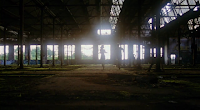Oliver Stone: Talk Radio and Born on the Fourth of July
Talk Radio is perhaps Oliver Stone's angriest film; an apt designation considering he teamed up with an even angrier man in playwright Eric Bogosian (who also stars as the lead). What they're angry at is more arbitrary than what Ron Kovic, the subject of Stone's 1989 hit film Born on the Fourth of July, is angry at. For Kovic the focus of that anger is clear: disillusionment and betrayal from those he trusted most (his government, his parents, American ideals); however, the anger directed by Barry, the subject of Stone's 1988 film Talk Radio, is more at society in general. Both films, though, have an angry director behind the camera; crystallizing his frustrations by using others' stories as source material. In Talk Radio it's the story of 'shock jock' (before Howard Stern popularized such a term) Barry (played by Bogosian who also co-wrote the play the film is based on which is also based on a book about Alan Berg, a radio host from Denver who was murdered in 1984…whew, did you get all that?) who has a popular late night talk show that caters to all kind of right-wing nutjobs and conspiracy theorists, not to mention the usual talk radio listener who seems to only exist to continuously irk the radio host with their clichéd philosophies on life. In Born on the Fourth of July it's Ron Kovic (Tom Cruise), a once baby-faced Midwestern high school wrestler who dreamt of making his mark in the Marines the way his father and grandfather (not to mention John Wayne in all of those WWII movies) did. Both films have similar themes about people being disillusioned with the culture that surrounds them, and both films have an angry undercurrent running through them.



























